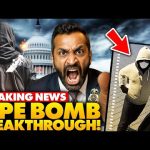A significant maneuver is underway in the Caribbean as the U.S. Navy positions the USS Gerald R. Ford and its escort ships in a show of strength and preparedness. Retired Navy Captain Chuck Nash shed some light on the implications of this naval deployment, suggesting that it serves multiple purposes. While some may view this as mere saber-rattling, experts believe it could be a strategic move to assert U.S. interests in a region where both China and Russia have been known to meddle. The intent is clear: the United States is signaling its readiness to respond to any threats emanating from the Western Hemisphere.
Captain Nash explained that the presence of aircraft carriers is never just about defense; they are primarily offensive tools. With a fleet comprising around 15 ships, including a Marine Expeditionary Unit, the U.S. military is demonstrating its capability to address various situations. Although the expectation of an invasion, reminiscent of past military operations in places like Iwo Jima, may be far-fetched, Nash emphasized that the focus lies on protecting the nation from seaborne drug trafficking. Dealing with the crises stemming from neighboring regions, including Mexico and Colombia, is paramount.
While some critics raise concerns about the costs of maintaining such a naval presence, Nash countered that these forces are on deployment regardless of their location. Troops will be compensated whether they are stationed in the Caribbean or elsewhere. The essence of this positioning is not just a show for show’s sake, but rather a firm declaration against illegal activities, including drug smuggling that undermines U.S. security and increases the challenges facing the nation.
A particularly vocal defender of this military posture is Senator Rick Scott from Florida. He reinforces the notion that the current Venezuelan regime, led by Nicolás Maduro, is not a government in the traditional sense but rather a cartel masquerading as a sovereign leadership. By endorsing President Trump’s actions in placing military assets in the region, Scott argues that Congress should not impede efforts to confront this threat. The consensus among some lawmakers seems to lean in favor of maintaining a strong military presence to tackle rogue regimes and criminal enterprises.
However, the mood in Washington remains mixed when discussing potential military action. Many fear a divided Congress may complicate the decision-making process whenever military measures are considered. Even though Captain Nash predicted that direct military action against Venezuela is unlikely, the U.S. remains vigilant. The history of the Venezuelan electoral process highlights the illegitimacy of Maduro’s rule, with claims of election theft adding urgency to the U.S. stance against his regime. With the support of many global leaders contesting Maduro’s authority, the stakes are high for both regional safety and international relations.
As the USS Gerald R. Ford and its accompanying vessels continue their mission, the world will be watching closely to see how the United States navigates this tense geopolitical landscape. The implications of these actions extend well beyond the Caribbean, serving as a reminder of the U.S. commitment to safeguarding its interests in the face of complex threats, whether they come from drug cartels or unfriendly state actors. The demonstration of military readiness not only reassures allies but also sends a clear message to adversaries: stay out of the U.S. sphere, or face the consequences.




